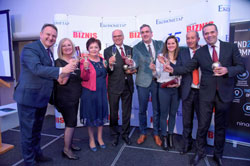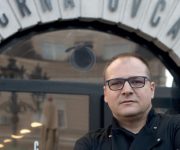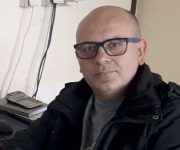Mark Drewell, Executive Chairman, New Foundation Farms, South West Mutual
Interview Exclusively for Business Magazine
Q: When did you decide to form New Foundation farms and why? Who are the founders?
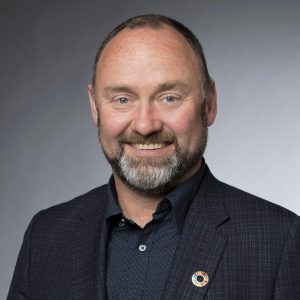
Mark Drewell
A: New Foundation Farms was first founded in 2018 by Mark Drewell and Marcus Link . They both have backgrounds in international business and are passionate about business having a more positive, not just sustaining, impact on the world.
Mark and Marcus believe entrepreneurial solutions operating at scale and with radical transparency will create the significant systems change needed in farming and food production. They recognised that it is critical because the way we farm today is both ecologivally and socially destructive – so much so that as Al Gore says it represents a real and present threat to our existence. They saw that the economic potential and ecological impact of regenerative agriculture is what is needed. So they set out to transform the sector initially in the UK but with ambition to be a global example that will inspire others.
After two years of research and development, with the strategic partnership of 3LM the UK hub of the Savory Institute, a next phase of the enterprise came in the summer of 2020, when finance expert Paul Pizzala , tech entrepreneur Wayne Gibbins and food industry brand and marketing expert Kirsty Saddler who were each pursuing their own visions for sustainable farming and food, connected with Mark and Marcus separately.
Now at the start of 2021 after building a detailed plan for a fully regenerative enterprise over endless lockdown Zoom calls, the five have come together as a founding team and launched a first round of fundraising to acquire a 1000 acre farm and launch the enterprise, proving the application of regenerative agriculture in the UK.
Q: What is the model of the business? In which parts of the world will it work?
A: New Foundation Farms is a regenerative enterprise, that will operate on a field to fork model producing nutrient dense produce, that is processed and sold in a way that retains more value for the workers and rural community and delivers more value to its citizen shoppers. All while generating high ecological value. The focus is on profit per acre not yield, which is supported by establishing complementary revenue streams on the farm, for example via renewable energy infrastructure or agritourism.
New Foundation Farms is starting in the UK, with a vision to grow regionally, nationally, across Europe and beyond. We accelerate change with both what we do and how we inspire others to do.
Q: How will you work with the network of professional international advisors and associates? What will it look like in practice?
A: We are proud to have the support of a strong group of international advisors, including Walter Jehn e an internationally recognised climate scientist, soil microbiologist and innovation strategist, leading systems change academic Dr. Katrin Muff who has heads up the Institute for Business Sustainability at Lucerne University and chief business designer Misa Lukic who led one of the world’s largest communications networks across 30 countries, with tremendous success. These advisors will help us set up a successful cross-sector enterprise, that is both profitable and effective at delivering regenerative impact in farming, food and across society.
Q: What does the term “regenerative agriculture” mean?
A: It means a way of farming that restores nature rather than destroying it. It puts primary importance on soil health and its improvement, because this improves biodiversity, the quality of produce, the depth of value that can be created for communities and the strength of our human appreciation for our place within nature.
In practise it means no till, continuous crop cover and a true diversity of horticulture, agroforestry and animal management. Unlike conventional agriculture, regenerative agriculture works with the patterns of nature so the more difference integrated on the land, the better. It’s a collaborative way of working with the natural conditions, not a controlling way that relies on costly inputs such as antibiotics, pesticides and fertiliser.
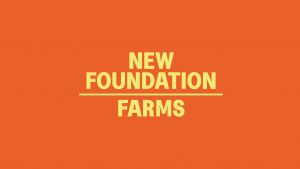 Q: How will the work of the Foundation be financed? Who are the investors?
Q: How will the work of the Foundation be financed? Who are the investors?
A: To date we have been self-financed. Now we are inviting aligned impact investors – those who want their capital to both create a financial return and produce a better world. The ask is £20million and we are able to provide opportunities for funders looking for 100% impact (e.g. philanthropists) those wanting a fixed ‘guaranteed’ annual return, and those looking for a higher risk/reward such as equity investors, we are using the capital to buy 1000 acres of farmland and set up the infrastructure required for processing and retail of the regenerative produce, to support the transition to regenerative agriculture over 4 years, along with establishing the knowledge base and regenerative food brand.
We are talking to family foundations, impact venture capital and high net worth individuals as well as people who own land in the UK. Our proposition is unique and has potential to create systems change, so it means we are as much interested in who provides the capital as how much.
Q: Explain to us your wording “we will build a regenerative agricultural food company that will produce food …” what will it look like in practice, in life?
A: Everything we are setting out to do has the potential to have a positive impact and is carefully measured.
The first part involves transitioning conventionally farmed industrial monoculture land to a regenerative approach. To build the key asset, the soil, we measure performance using the Ecological Health Index, which will track the improvement of soil health, surrounding biodiversity, and water quality and management.
Then we establish processing and retail facilities to be able to turn what we grow into food to be sold directly to people. This happens on our farms with farm shops, cafes and restaurants. It also happens offsite with home delivery and distribution of regenerative produce through supermarkets and to restaurants.
In the next phase we do this on one large farming operation but this will then expand to multiple farms we will own, as well as through other farmers who supply us to sell their produce directly to people.
Overall it means we have much more profitable farming, employing many more people and also teaching others how to do it. The food we grow will also be more nutritious meaning we can give people food choices that are less processed and healthier for your gut.
Q: Will you work only in rural areas and who will be eligible to work with your Foundation?
A: We will work on land that has potential to create change, this could be rural or urban but we are looking for scale at the start and so rural. This is to prove the economic case and ecological impact of regenerative farming in the UK, where it is not developed enough. Nature thrives on diversity and so will we, if we have true diversity amongst those who work at New Foundation Farms and work with us. We need experts and enthusiasts, particularly as a standard large scale farm in the UK employs five people and as a similar sized regenerative farm we will employ over 100 people.
Q: What is “nature-destroying agriculture” and how to stop it?
A: Conventional farming destroys the soil, reduces biodiversity and the nutrition of the food it produces. It operates against nature, not with it.
This kind of agriculture could be made more sustainable by reducing its negative impact, but we are out of time for that to be a viable option. We know we have nine years now to reach the science based targets for mitigating the climate crisis. So change needs to be more radical and the regenerative agriculture we are planning for, can dramatically change the ecological outcomes of land.
We also intend to stop ‘nature-destroying agriculture’ by helping reconnect people to the importance of their food choices and of questioning where their food is from – not just provenance, but how it was produced. Market forces, not just farmers, can help with this transition away from conventional agriculture.
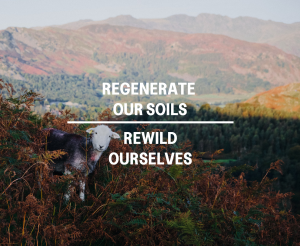 Q: Has there been a similar project in the world so far, in previous years?
Q: Has there been a similar project in the world so far, in previous years?
A: There are a number of examples of regeneratively farmed farms across the world, especially in the United States, Brazil and Australia. Yet there are few regenerative enterprises that are designed from the outset to operate field to fork, the benefit of which is to educate and transition customer demand in tandem with transitioning farming for increased scale of regenerative produce supply. We believe New Foundation Farms takes a systems approach, as we have taken a holistic view on the issues and so given the founders have all come together with purpose as their main motivation and backgrounds in agriculture, tech, change management, brand & marketing and investment, the enterprise is designed for system change.
Q: What do you think is most alarming about nature, agriculture and the food that people consume?
A: The most alarming issues are that the way we farm is degenerative and destructive to nature, in the UK where 73% of our land is used for agricultural purposes, it ranks 189th out of 218 countries globally for biodiversity. What we eat is increasingly processed and so is contributing to rising rates of diet-related death, whether from obesity, heart disease or diabetes this is exacerbated by disproportionately large corporate companies controlling our global food system, IPES ‘Too Big To Feed’ 1 highlights ‘the risks arising from unprecedented consolidation at every node of the agri-food chain’ as 10 companies control 90% of food & beverage processing.
Q: What should be the “new generation of farmers” you stand for?
A: Firstly agriculture should be better recognised as a foundation of our society, as it influences our ecological and health outcomes.
We believe there is opportunity for a new generation of farmers who understand that farming can be done with nature, moving away from mono crops and singular uses of land. There is also opportunity to bring a greater diversity of people into farming as in the UK it is male dominated and not as accessible to women, people of different ethnic and cultural backgrounds as we will have better solutions, innovations and collaborations if we have more diverse mindsets.
Q: What is a healthy technology that you think can be applied?
A: Whatever the technology is that we use, it must be in service of improving the soil health which means we are working with the worms, microbes and mycelium as they have technology that will help us progress. This last point highlights that in regenerative technology is not necessarily man-made, as in holistic management it is as much about the tools we avoid using as it is the ones we do use. As it’s important to avoid unnecessary solid and root disturbance. There are two examples of technology that we think are exemplary;
Soil Heroes in the Netherlands are using biofertilizer, a fertilizer that is biological not chemical in origin so has a positive impact on the soil, in partnership with controlled traffic farming which avoids soil disturbance and compaction. This allows you to move between crops, without ploughing. Balbo Group in Brazil developed machinery that allows them to harvest the sugar cane when it is green, meaning that they do not have to burn the sugar cane in order to harvest the sugar. This means all the biomass they don’t need can be left behind on the soil, to ensure the nutrients are reabsorbed by the soil.
Q: Did you do research related to agriculture before you started this project? What did that research show?
A: Over two years of research we have identified both what is wrong with the current approach and how to fix it. We were able to identify case studies of different successful approaches across the world.
Working with 3LM, the Savory Institute’s UK hub, a key insight was regenerative agriculture must be context specific, to the land and climate. This enabled us to build the best operational plan for scaled transition of UK farming even when UK farmland is some of the most expensive in the world.
Wayne, as our CTO has also contributed to this, with a tech background and now studying for an MSc in AgTech & Innovation at the Royal Agricultural University.
Q: Will you work internationally and which part of the world do you consider most vulnerable?
A: Our aim is to affect change with our own work, but also to inspire transition to regenerative practises by sharing our work with others as much and as widely as possible. We hope our influence will extend internationally before our owned operations do, but our plan extends to 2030 and internationally.
Every country has a reliance on their national food system and so is vulnerable to degenerative agricultural practices, but those countries who have higher proportion of their land used for agriculture are at greater risk. This is mainly due to the negative ecological impacts.
Q: Is your focus also on Serbia? What kind of cooperation do you expect in Serbia?
A: Currently our focus is on the UK, but given the importance of agriculture in Serbia as it contributes to 6% of GDP (as of 2017) 2 and employs 15% of the population (as of 2018) it would be ideal to engage the national farming sector in the regenerative agriculture opportunity. Given the vast majority of Serbian farms are traditional family owned and run, the transition to regenerative practices may not be as challenging as it is in more corporate, industrial farms.
Q: What is your message for Serbia regarding the work of New Foundation Farms?
A: We would welcome interest in our regenerative business model, from professional investors, collaborators and anyone from within the Serbian agricultural sector.
We believe that we are at a crossroads for our international and national food systems, where we need to make significant and rapid changes for the good of human and planetary health.
We hope that in that context, discussions are taking place in Serbia about the opportunities this presents. New models for business are needed, ones that are more transparent and purpose-led, which presents an opportunity for innovation, new thinking and prosperity. If we can help inform them in any way, based on our years of research and the design of our enterprise, we would be very happy to do so.
Editor in Chief
Radojka Nikolic









